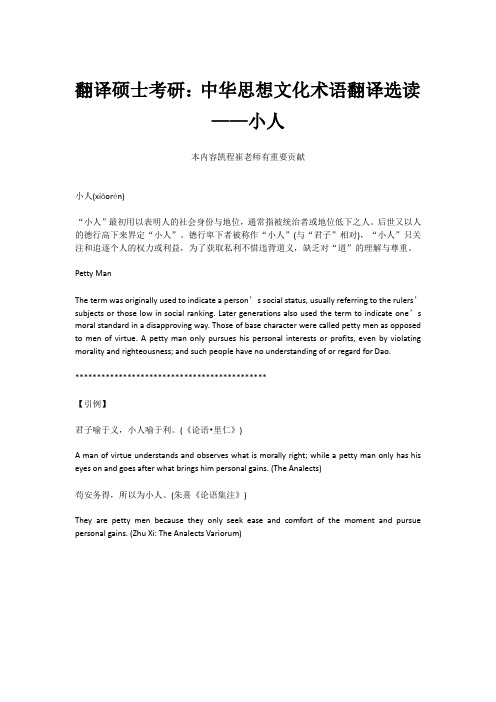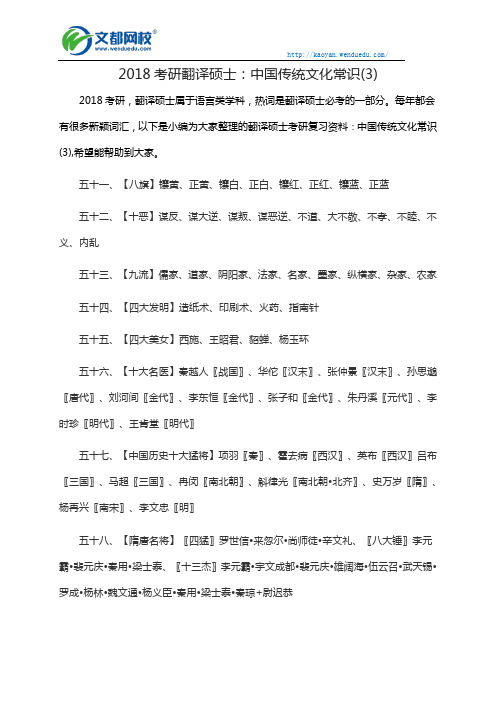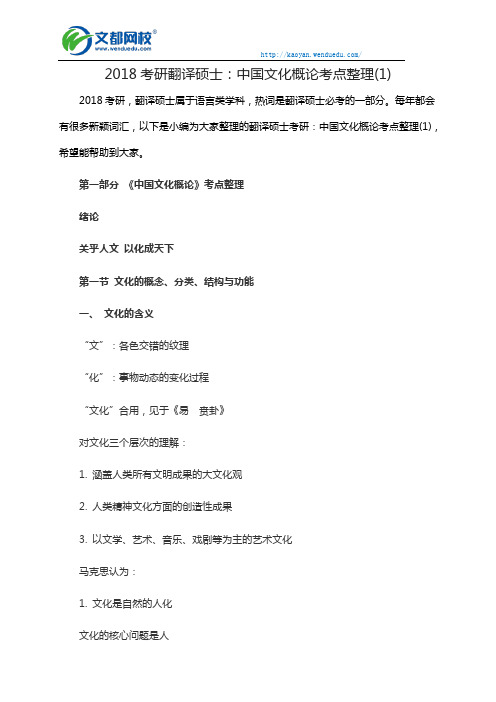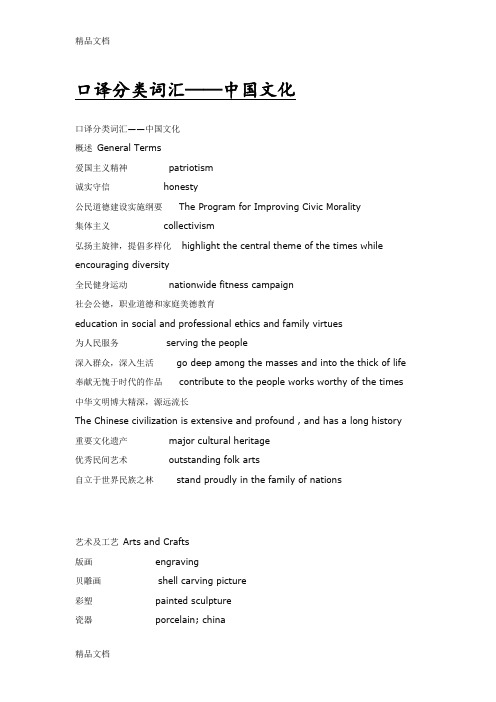2018年翻硕考研之中华文化术语翻译整理
2018考研翻译硕士:中国文化概论考点整理(2)

2018考研翻译硕士:中国文化概论考点整理(2) 2018考研,翻译硕士属于语言类学科,热词是翻译硕士必考的一部分。
每年都会有很多新颖词汇,以下是小编为大家整理的翻译硕士考研:中国文化概论考点整理(2),希望能帮助到大家。
第一章中国传统社会和文化的总体概貌中国传统社会的基本特征:自给自足的自然经济和血缘宗法伦理制度第一节中国传统社会特征之一:农业自然经济自然经济:以自给自足为生产目的的一种经济模式,与以交换为目的,以营利为宗旨的商品经济相对立。
自然经济的基础和特点:农业与家庭手工业相结合。
是社会生产力水平低下和社会分工不发达的产物,占统治地位的是使用价值,而不是交换价值。
发展:母系氏族公社时期(原始农业的开端)-------夏末至商代(由原始氏族公社变为奴隶主贵族庄园)------周代初期(土地分封制)-------秦时期封建国家形成(自然经济起决定作用)封建经济的基础:分散的个体生产。
耕织结合构成了以家庭为主的经济单位的主要的经济活动内容。
小农经济占统治地位的原因:1. 重农抑商政策2. 由中国传统土地所有制和统治者残酷的经济剥削造成3. 由孔孟儒学灌输的与统治者重农抑商政策一致的重农抑商思想所致春秋战国时期就出现了“独立自由”的手工业者与商人历代官府手工业也属于自然经济的性质范畴。
第二节中国传统社会特征之二:血缘宗法制度一、含义:宗”:与祭祀之庙宇有关,有宗社之义,是中国文化祖先崇拜的代码“族”:在血统上相联系的人祖先崇拜与血缘关系成为中国传统社会存在的核心,形成血缘宗法制二、形成宗法制度渊源可以追溯到原始父系氏族公社或家庭公社时期-----“家天下”(形成于商,完善于周)在国家最初形成过程中,血缘与国家政权紧密结合形成宗法世袭制。
商朝仍是“家天下”,国家形式仍是以王为首的奴隶主贵族政体。
西周完善和实行了以血缘关系为核心的分土封侯制度。
土地分封制和血缘宗法制构成周朝的社会制度和政权机构。
春秋末期,孔孟要恢复周礼。
翻译硕士考研:中华思想文化术语翻译选读——小人

翻译硕士考研:中华思想文化术语翻译选读——小人本内容凯程崔老师有重要贡献小人(xiǎorén)“小人”最初用以表明人的社会身份与地位,通常指被统治者或地位低下之人。
后世又以人的德行高下来界定“小人”。
德行卑下者被称作“小人”(与“君子”相对),“小人”只关注和追逐个人的权力或利益,为了获取私利不惜违背道义,缺乏对“道”的理解与尊重。
Petty ManThe term was originally used to indicate a person’s social status, usually referring to the rulers’subjects or those low in social ranking. Later generations also used the term to indicate one’s moral standard in a disapproving way. Those of base character were called petty men as opposed to men of virtue. A petty man only pursues his personal interests or profits, even by violating morality and righteousness; and such people have no understanding of or regard for Dao.********************************************【引例】君子喻于义,小人喻于利。
(《论语•里仁》)A man of virtue understands and observes what is morally right; while a petty man only has his eyes on and goes after what brings him personal gains. (The Analects)苟安务得,所以为小人。
中国文化词翻译

1. 元宵节:Lantern Festival2. 刺绣:embroidery3. 重阳节:Double-Ninth Festival4. 清明节:Tomb sweeping day5. 剪纸:Paper Cutting6. 书法:Calligraphy7. 对联:(Spring Festival) Couplets8. 象形文字:Pictograms/Pictographic Characters9. 人才流动:Brain Drain/Brain Flow10. 四合院:Siheyuan/Quadrangle11. 战国:Warring States12. 风水:Fengshui/Geomantic Omen13. 铁饭碗:Iron Bowl14. 函授部:The Correspondence Department15. 集体舞:Group Dance16. 黄土高原:Loess Plateau17. 红白喜事:Weddings and Funerals18. 中秋节:Mid-Autumn Day19. 结婚证:Marriage Certificate20. 儒家文化:Confucian Culture21. 附属学校:Affiliated school22. 古装片:Costume Drama23. 武打片:Chinese Swordplay Movie24. 元宵:T angyuan/Sweet Rice Dumpling (Soup)25. 一国两制:One Country, Two Systems26. 火锅:Hot Pot27. 四人帮:Gang of Four28. 《诗经》:The Book of Songs29. 素质教育:Essential-qualities-oriented Education30. 《史记》:Historical Records/Records of the Grand Historian31. 大跃进:Great Leap Forward (Movement)32. 《西游记》:The Journey to the West33. 除夕:Chinese New Year’s Eve/Eve of the Spring Festival34. 针灸:Acupuncture35. 唐三彩:Tri-color Pottery of the T ang Dynasty/ The T ang Tri-colored pottery36. 中国特色的社会主义:Chinese-charactered Socialist/Socialist with Chinese characteristics37. 偏旁:radical38. 孟子:Mencius39. 亭/阁:Pavilion/ Attic40. 大中型国有企业:Large and Medium-sized State-owned Enterprises41. 火药:gunpowder42. 农历:Lunar Calendar43. 印/玺:Seal/Stamp44. 物质精神文明建设:The Construction of Material Civilization and Spiritual Civilization45. 京剧:Beijing Opera/Peking Opera46. 秦腔:Crying of Qin People/Qin Opera47. 太极拳:T ai Chi48. 独生子女证:The Certificate of One-child49. 天坛:Altar of Heaven in Beijing50. 小吃摊:Snack Bar/Snack Stand51. 红双喜:Double Happiness52. 政治辅导员:Political Counselor/School Counselor53. 春卷:Spring Roll(s)54. 莲藕:Lotus Root55. 追星族:Star Struck56. 故宫博物院:The Palace Museum57. 相声:Cross-talk/Comic Dialogue58. 下岗:Lay off/Laid off59. 北京烤鸭:Beijing Roast Duck60. 高等自学考试:Self-taught Examination of Higher Education61. 烟花爆竹:fireworks and firecracker62. 敦煌莫高窟:Mogao Caves63. 电视小品:TV Sketch/TV Skit64. 香港澳门同胞:Compatriots from Hong Kong and Macao65. 文化大革命:Cultural Revolution66. 长江中下游地区:The Mid-low Reaches of Yangtze River67. 门当户对:Perfect Match/Exact Match68. 《水浒》:Water Margin/Outlaws of the Marsh69. 中外合资企业:Joint Ventures70. 文房四宝(笔墨纸砚):"The Four Treasure of the Study" "Brush, Inkstick, Paper, and Inkstone",。
2018考研翻译硕士:中国传统文化常识(3)

2018考研翻译硕士:中国传统文化常识(3) 2018考研,翻译硕士属于语言类学科,热词是翻译硕士必考的一部分。
每年都会有很多新颖词汇,以下是小编为大家整理的翻译硕士考研复习资料:中国传统文化常识(3),希望能帮助到大家。
五十一、【八旗】镶黄、正黄、镶白、正白、镶红、正红、镶蓝、正蓝五十二、【十恶】谋反、谋大逆、谋叛、谋恶逆、不道、大不敬、不孝、不睦、不义、内乱五十三、【九流】儒家、道家、阴阳家、法家、名家、墨家、纵横家、杂家、农家五十四、【四大发明】造纸术、印刷术、火药、指南针五十五、【四大美女】西施、王昭君、貂蝉、杨玉环五十六、【十大名医】秦越人〖战国〗、华佗〖汉末〗、张仲景〖汉末〗、孙思邈〖唐代〗、刘河间〖金代〗、李东恒〖金代〗、张子和〖金代〗、朱丹溪〖元代〗、李时珍〖明代〗、王肯堂〖明代〗五十七、【中国历史十大猛将】项羽〖秦〗、霍去病〖西汉〗、英布〖西汉〗吕布〖三国〗、马超〖三国〗、冉闵〖南北朝〗、斛律光〖南北朝•北齐〗、史万岁〖隋〗、杨再兴〖南宋〗、李文忠〖明〗五十八、【隋唐名将】〖四猛〗罗世信•来忽尔•尚师徒•辛文礼、〖八大锤〗李元霸•裴元庆•秦用•梁士泰、〖十三杰〗李元霸•宇文成都•裴元庆•雄阔海•伍云召•武天锡•罗成•杨林•魏文通•杨义臣•秦用•梁士泰•秦琼+尉迟恭五十九、【名将十哲】田穰苴〖春秋〗、孙武〖春秋〗、吴起〖战国〗、乐毅〖战国〗、白起〖战国〗、张良〖汉初〗、韩信〖汉初〗、诸葛亮〖三国〗、李靖〖唐初〗、李勣〖唐初〗六十、【三山】安徽黄山、江西庐山、浙江雁荡山六十一、【五岭】越城岭、都庞岭、萌诸岭、骑田岭、大庾岭六十二、【五岳】〖中岳〗河南嵩山、〖东岳〗山东泰山、〖西岳〗陕西华山、〖南岳〗湖南衡山、〖北岳〗山西恒山六十三、【五湖】鄱阳湖〖江西〗、洞庭湖〖湖南〗、太湖〖江苏〗、洪泽湖〖江苏〗、巢湖〖安徽〗六十五、【蜀三关】阳平关、江关、白水关六十七、【义阳三关】平靖关、黄岘关、武阳关六十八、【古代内三关】居庸关、紫荆关、倒马关六十九、【古代外三关】雁门关、宁武关、偏头关七十、【北京三山】万寿山、玉泉山、香山七十一、【福州三山】屏山、乌山、九仙山七十二、【盛京三陵】福陵、昭陵、永陵七十三、【盘山三胜】松、泉、石七十四、【晋祠三绝】圣母殿、周柏、难老泉七十五、【雁荡三绝】:灵峰、灵岩、大龙湫七十六、【长江三峡】瞿塘峡、巫峡、西陵峡七十七、【大宁河小三峡】龙门峡、巴雾峡、滴翠峡七十八、【西江小三峡】大鼎峡、三榕峡、羚羊峡七十九、【岷江小三峡】平羌峡、背城峡、犁头峡八十、【嘉陵江小三峡】沥鼻峡、温塘峡、观音峡八十一、【四大名桥】广济桥、赵州桥、洛阳桥、卢沟桥八十二、【四大名园】颐和园〖北京〗、避暑山庄〖河北承德〗、拙政园〖江苏苏州〗、留园〖江苏苏州〗八十三、【四大名刹】灵岩寺〖山东长清〗、国清寺〖浙江天台〗、玉泉寺〖湖北江陵〗、栖霞寺〖江苏南京〗八十四、【四大名楼】岳阳楼〖湖南岳阳〗、黄鹤楼〖湖北武汉〗、滕王阁〖江西南昌〗、大观楼〖云南昆明〗八十五、【四大名亭】醉翁亭〖安徽滁县〗、陶然亭〖北京先农坛〗、爱晚亭〖湖南长沙〗、湖心亭〖杭州西湖〗八十六、【四大古镇】景德镇〖江西〗、佛山镇〖广东〗、汉口镇〖湖北〗、朱仙镇〖河南〗八十七、【四大碑林】西安碑林〖陕西西安〗、孔庙碑林〖山东曲阜〗、地震碑林〖四川西昌〗、南门碑林〖台湾高雄〗八十八、【四大名塔】嵩岳寺塔〖河南登封嵩岳寺〗、飞虹塔〖山西洪洞广胜寺〗、释迦塔〖山西应县佛宫寺〗、千寻塔〖云南大理崇圣寺〗八十九、【四大石窟】莫高窟〖甘肃敦煌〗、云岗石窟〖山西大同〗、龙门石窟〖河南洛阳〗、麦积山石窟〖甘肃天水〗九十、【四大书院】白鹿洞书院〖江西庐山〗、岳麓书院〖湖南长沙〗、嵩阳书院〖河南嵩山〗、应天书院〖河南商丘〗九十一、【七大藏书楼】文渊阁〖北京〗、文源阁〖北京〗、文津阁〖承德〗、文溯阁〖沈阳〗、文汇阁〖扬州〗、文淙阁〖镇江〗、文澜阁〖杭州〗九十二、【九大名关】山海关〖河北〗、居庸关〖北京〗、紫荆关〖河北〗、娘子关〖山西〗、平型关〖山西〗、雁门关〖山西〗、嘉峪关〖甘肃〗、武胜关〖河南〗、镇南关(今名友谊关)〖广西〗九十三、【四大佛教名山】浙江普陀山〖观音菩萨〗、山西五台山〖文殊菩萨〗、四川峨眉山〖普贤菩萨〗、安徽九华山〖地藏王菩萨〗九十四、【四大道教名山】湖北武当山、江西龙虎山、安徽齐云山、四川青城山九十五、【西湖十景】三潭印月、苏堤春晓、平湖秋月、双峰插云、柳浪闻莺、花港观鱼、曲院风荷、断桥残雪、南屏晚钟、雷峰夕照九十六、【碣石十景】碣石观海、天柱凌云、山岩春晓、石洞秋风、西嶂排青、东峰耸翠、龙蝠灵壑、风翥祥峦、霞辉窣堵、仙影沧浪九十七、【台湾十二胜】角板山、草山北投、新店、大溪、玉山、八卦山、虎头牌、狮头山、太平山、大里简、旗山、雾社九十八、【巫山十二奇峰】神女、翠屏、朝云、松峦、集仙、聚鹤、净坛、上升、起云、飞凤、登龙、圣泉九十九、【五行】金、木、水、火、土一百、【八卦】乾〖天〗、坤〖地〗、震〖雷〗、巽〖风〗、坎〖水〗、离〖火〗、艮〖山〗、兑〖沼〗。
2018考研翻译硕士:中国文化概论考点整理(1)

2018考研翻译硕士:中国文化概论考点整理(1) 2018考研,翻译硕士属于语言类学科,热词是翻译硕士必考的一部分。
每年都会有很多新颖词汇,以下是小编为大家整理的翻译硕士考研:中国文化概论考点整理(1),希望能帮助到大家。
第一部分《中国文化概论》考点整理
绪论
关乎人文以化成天下
第一节文化的概念、分类、结构与功能
一、文化的含义
“文”:各色交错的纹理
“化”:事物动态的变化过程
“文化”合用,见于《易 贲卦》
对文化三个层次的理解:
1. 涵盖人类所有文明成果的大文化观
2. 人类精神文化方面的创造性成果
3. 以文学、艺术、音乐、戏剧等为主的艺术文化
马克思认为:
1. 文化是自然的人化
文化的核心问题是人
2. 文化是人的全部社会关系的总和
文化产生的基础:人与人之间的社会联系
二、分类与结构
(一) 物质生产文化
(二) 制度行为文化
(三) 精神心理文化
三、功能
(一) 记录功能
(二) 认知功能
(三) 传播功能:言语、文字、实物等各种传播手段
(四) 教化功能
(五) 凝聚功能:中华民族文化的凝聚功能,主要表现为伟大的爱国主义。
(六) 调控功能:手段有——巫术图腾、道德宗法、法律暴力
第二节中国传统文化与理想人格
一、三元会通的中国文化
由中国传统文化、马列主义文化、西方文化三元汇一
二、中国传统文化的理想人格与人生境界
中国传统文化人生理想境界论的最重要的特征是对人生的热爱
人生理想境界是“与天地合其德”,核心内容是仁。
(整理)中国传统文化词汇翻译.

口译分类词汇——中国文化口译分类词汇——中国文化概述General Terms爱国主义精神patriotism诚实守信honesty公民道德建设实施纲要The Program for Improving Civic Morality集体主义collectivism弘扬主旋律,提倡多样化highlight the central theme of the times while encouraging diversity全民健身运动nationwide fitness campaign社会公德,职业道德和家庭美德教育education in social and professional ethics and family virtues为人民服务serving the people深入群众,深入生活go deep among the masses and into the thick of life 奉献无愧于时代的作品contribute to the people works worthy of the times 中华文明博大精深,源远流长The Chinese civilization is extensive and profound , and has a long history 重要文化遗产major cultural heritage优秀民间艺术outstanding folk arts自立于世界民族之林stand proudly in the family of nations艺术及工艺Arts and Crafts版画engraving贝雕画shell carving picture彩塑painted sculpture瓷器porcelain; china刺绣embroidery雕刻carving宫灯palace lantern国画Chinese painting剪纸paper-cut景德镇瓷Jingdezhen porcelain景泰蓝cloisonné enamel蜡染batik卖秸画straw patchwork木/石/竹刻wood/stone/bamboo carving木刻画wood engraving泥人儿clay figure皮影shadow puppet漆画lacquer painting漆器lacquer ware双面绣two-sided embroidery水墨画Chinese brush drawing ; ink and wash painting檀香扇sandalwood fan唐三彩Tang tri-colored pottery陶器pottery ; earthenware图章seal拓碑making rubbings from inscriptions , pictures , etc . on stone tablets拓片rubbing微雕miniature engraving象牙雕刻ivory carving宜兴陶Yixing pottery篆刻seal cutting戏剧表演Theatrical Performances京剧人物脸谱types of facial makeup in Beijing opera生male characters末middle-aged male characters净“painted face” characters旦female characters丑clown京剧票友amateur performer of Peking Opera木偶戏puppet show独角戏monodrama; one-man play皮影戏shadow play ; leather-silhouette show折子戏opera highlights戏剧小品skit哑剧dumb show ; mime ; mummery ; pantomime单口相声monologue comic talk双口相声witty dialogue口技vocal imitations ; ventriloquism说书monologue story-telling杂技acrobatic performance叠罗汉making a human pyramid特技stunt睬高跷stilt walk马戏circus performances神话人物Mythological Figures八仙the Eight Immortals嫦娥Chang’s ( the Chinese moon goddess)伏羲Fu Xi (God of Fishery and Husbandry)福禄寿三星the three gods of fortune , prosperity and longevity 共工God of Water后羿Houyi (a legendary hero who shot down nine suns ) 黄帝Yellow Emperor夸父Kuafu (a fabled sun-chasing giant )女Goddess of Sky-patching盘古Pan Gu (creator of the universe )神农Patron of Agriculture禹Yu ( the reputed founder of the Xia Dynasty )祝融God of Fire古代建筑Ancient Architecture塔pagoda琉璃塔glazed stupa舍利塔dagoba ; sarira stupa ( a pagoda for Buddhist relics )舍利子sarira remains from cremation of Buddha’s of saints’ body 喇叭塔Lamaist pagoda楼storied buildings钟楼bell tower鼓楼drum tower阁pavilion烽火台beacon tower华表ornamental column牌坊memorial archway传统节日Traditional Festivals拜年paying a New Year call爆竹firecracker鞭炮 a string of small firecrackers除夕New Year’s Eve春节Spring Festival春联Spring Festival couplets (conveying best wishes for the year ) 辞旧迎新bid farewell to the old and usher in the new ; ring out the old year and ring in the new大扫除year-end household cleaning灯谜lantern riddles登高hill climbing端午节Dragon Boat Festival恭喜发财May you be prosperous! / Wish you all the best !观灯viewing the lanterns贺年片New Year film饺子dumplings (with meat and vegetable stuffing )龙灯舞dragon lantern dance庙会temple fair年画New Year picture年夜饭family reunion dinner on Lunar New Year’s Eve清明节Tomb-sweeping Festival扫墓paying respect to the dead赏菊enjoying chrysanthemum赏月enjoying the full moon狮子舞lion dance压岁钱money given to children as a Lunar New Year gift秧歌舞yangge dance元宵sweet rice-flour dumplings (eaten on the Lantern Festival ) 元宵节Lantern Festival月饼moon cake植树节Tree-planting Day中秋节Mid-autumn Festival重阳节Double Ninth Festival粽子 a pyramid-shaped dumpling made of glutinous rice wrapped in bamboo or reed leaves烹饪Culinary Arts美食节gourmet festival中餐烹饪Chinese cuisine色,香,味俱全perfect combination of color , aroma , taste and appearance四大菜系:山东菜,四川菜,粤菜,扬州菜four major Chinese cuisines: Shandong cuisine , Sichuan cuisine , Canton cuisine and Yangzhoucuisine南淡北咸,东甜西辣the light southern cuisine , and the salty northern cuisine ;the sweet eastern cuisine , and the spicy western cuisine八宝菜eight-treasure pickles ( assorted walnut meats , asparagus , lettuce , almonds , cucumber and peanuts , etc . pickled in soy sauce )八宝饭eight-treasure rice pudding (glutinous rice steamed with preserved fruits , sweetened bean paste , lotus seeds , longan , etc.)白斩鸡tender boiled chicken (made by boiling a whole chicken in water and cutting into cubes , then dipping into seasonings )臭豆腐odd-odour bean curb粉蒸肉pork streamed with rice flour风味小吃local delicacy腐竹rolls of dried bean milk cream冷盘hors d’oeuvres萨其马Manchu candied fritter cut in squares刀切,火候Cutting and Slicing Techniques , Heat Control切片slicing切条cutting to strips切丝shredding切柳filleting切丁dicing切碎mincing磨碎grinding大/旺/武火strong heat中火medium heat小/微/文火gentle heat烹饪方法Cooking Techniques煎pan-frying炒stir-frying爆quick-frying炸deep-frying烩stewing熏smoking煨simmering煮boiling烘baking烤roasting蒸steaming红烧braising (with soy sauce ) 涮羊肉dip-boiled mutton slices 羊肉串小摊mutton barbecue stall宗教Religions佛教Buddhism释迦牟尼Sakyamuni佛寺Buddhist temple大雄宝殿the Great Buddha’s Hall藏经楼depositary of Buddhist texts金刚经Vajracchedika-sutra素菜馆vegetarian restaurant罗汉堂arhat hall观音Guanyin; Goddess of Mercy; Avalokitesvara地藏God of Earth四大金刚Four Heavenly Guardians (at the entrance to a Buddhism temple);Four Devarajas四大天王Four Heavenly Kings因果报应karma藏传佛教Lamaism大藏经Tripitaka转世灵童reincarnated soul boy喇嘛庙lamasery道教Taoism道观Taoist temple道士Taoist priest关帝庙temple of Lord Guan儒教Confucianism孔子庙Confucian temple孔子Confucius义,礼,智,信,忠,恕,孝,悌rightness, propriety , wisdom , trustworthiness , loyalty , reciprocity ,filial piety , brotherly love学儿优则仕 A good scholar can become an official ./ He who excels instudy can follow an official career .禅宗Zen Buddhism不立别传,不立文字,直指人心,见性成佛。
2018考研翻译硕士:中国传统文化常识(4)
2018考研翻译硕士:中国传统文化常识(4) 2018考研,翻译硕士属于语言类学科,热词是翻译硕士必考的一部分。
每年都会有很多新颖词汇,以下是小编为大家整理的翻译硕士考研复习资料:中国传统文化常识(4),希望能帮助到大家。
一百零一、【三皇】伏羲、女娲、神农一百零二、【五帝】太皞、炎帝、黄帝、少皞、颛顼一百零四、【三教】儒教、道教、佛教一百零五、【三清】元始天尊〖清微天玉清境〗、灵宝天尊〖禹余天上清境〗、道德天尊〖大赤天太清境〗一百零六、【四御】昊天金阙无上至尊玉皇大帝、中天紫微北极大帝、勾陈上宫天后皇大帝、承天效法土皇地祗一百零七、【八仙】铁拐李、钟离权、张果老、吕洞宾、何仙姑、蓝采和、韩湘子、曹国舅一百零八、【龙九子】辟玺负碑、螭吻望守、蒲牢盘钟、狴犴守拱、睚眦化刃、饕餮潜器、鲅夏匐阶、狻猊伴鼓、椒图衔环一百零九、【过去七佛】释迦牟尼佛、拘那含佛、毗舍婆佛、毗婆尸佛、尸弃佛、拘楼孙佛、迦叶佛一百一十、【八菩萨】观音菩萨、普贤菩萨、文殊菩萨、地藏王菩萨、灵吉菩萨、大势至菩萨、日光菩萨、月光菩萨一百一十一、【十大弟子】舍利弗(智慧第一)、目犍连(神通第一)、阿难陀(多闻第一)、优波离(持戒第一)、阿那律(天眼第一)、大迦叶(头陀第一)、富楼那(说法第一)、迦旃延(论议第一)、罗睺罗(密行第一)、须菩提(解空第一)一百一十二、【十八罗汉】布袋罗汉、长眉罗汉、芭蕉罗汉、沉思罗汉、伏虎罗汉、过江罗汉、欢喜罗汉、降龙罗汉、郊游罗汉、举钵罗汉、开心罗汉、看门罗汉、骑象罗汉、探手罗汉、托塔罗汉、挖耳罗汉、笑狮罗汉、坐鹿罗汉一百一十三、【XXXXX伽蓝】美音、梵音、天鼓、叹妙、叹美、摩妙、雷音、师子、妙叹、梵响、人音、佛奴、颂德、广目、妙眼、彻听、彻视、遍视一百一十四、【二十八星宿】东官苍龙:〖角木蛟〗、〖亢金龙〗、〖氐土貉〗、〖房日兔〗、〖心月狐〗、〖尾火虎〗、〖箕水豹〗北官玄武:〖斗水獬〗、〖牛金牛〗、〖女土蝠〗、〖虚日鼠〗、〖危月燕〗、〖室火猪〗、〖壁水狳〗西官白虎:〖奎木狼〗、〖娄金狗〗、〖胃土雉〗、〖昂日鸡〗、〖毕月乌〗、〖觜火猴〗、〖参水猿〗南官朱雀:〖井水犴〗、〖鬼金羊〗、〖柳土獐〗、〖星日马〗、〖张月鹿〗、〖翼火蛇〗、〖轸水蚓〗一百一十五、【十殿阎王】[第一殿] 秦广王、[第二殿] 楚江王、[第三殿] 宋帝王、[第四殿] 五官王、[第五殿] 阎罗王、[第六殿] 卞城王、[第七殿] 泰山王、[第八殿] 都市王、[第九殿] 平等王、[第十殿] 转轮王一百一十六、【二十四诸天】大梵天王、帝释尊天、多闻天王、持国天王、增长天王、广目天王、密迹金刚、大自在天、散脂大将、大辩才天、大功德天、韦陀天神,、坚牢地神、菩提树神、鬼子母神、摩利支天、日宫天子、月官天子、娑竭罗龙、阎摩罗王、紧那罗、紫微大帝、东岳大帝、雷神一百一十七、【易经八卦】乾为天、坤为地、水雷屯、山水蒙、水天需、天水讼、地水师、水地比、风天小畜、天泽履、地天泰、天地否、天火同人、火天大有、地山谦、雷地豫、泽雷随、山风蛊、地泽临、风地观、火雷噬嗑、山火贲、山地剥、地雷复、天雷旡妄、山天大畜、山雷颐、泽风大过、坎为水、离为火、泽山咸、雷风恒、天山遯、雷天大壮、火地晋、地火明夷、、风火家人、火泽睽、水山蹇、雷水解、山泽损、风雷益、泽天夬、天风姤、泽地萃、地风升、泽水困、水风井、泽火革、火风鼎、震为雷、艮为山、风山渐、雷泽归妹、雷火丰、火山旅、巽为风、兑为泽、风水涣、水泽节、风泽中孚、雷山小过、水火既济、火水未济一百一十八、【十八层地狱】[第一层]泥犁地狱、[第二层]刀山地狱、[第三层]沸沙地狱、[第四层]沸屎地狱、[第五层]黑身地狱、[第六层]火车地狱、[第七层]镬汤地狱、[第八层]铁床地狱、[第九层]盖山地狱、[第十层]寒冰地狱、[第十一层]剥皮地狱、[第十二层]畜生地狱、[第十三层]刀兵地狱、[第十四层]铁磨地狱、[第十五层]冰地狱、[第十六层]铁册地狱、[第十七层]蛆虫地狱、[第XXXXX层]烊铜地狱另:第一层:拔舌地狱。
中国传统文化专用词汇英文翻译
中国传统文化专用词汇英文翻译常见中国传统文化专用词汇英文翻译1、中国意念词(Chinesenesses)八卦trigram阴、阳yin, yang道Dao(cf. logo)江湖(世界) the jianghu World (the traits’ world)e.g. You can’t control everything in a traits’ world. (人在江湖,身不由己)道Daoism(Taoism)上火excessive internal heat儒学Confucianism红学(《红楼梦》研究) redology世外桃源Shangri-la or Arcadia开放kaifang (Chinese openness to the outside world)大锅饭getting an equal share regardless of the work done伤痕文学scar literature or the literature of the wounded 不搞一刀切no imposing uniformity on …合乎国情,顺乎民意to conform with the national conditions and the will of the people乱摊派,乱收费imposition of arbitrary quotas and service charge铁交椅iron (lifetime) post’s; guaranteed leading post脱贫to shake off poverty; anti-poverty治则兴,乱则衰Order leads to prosperity and chaos to decline2 、中华民族的喜庆节日(Chinese Festivial)国庆节National Day中秋节Mid-Autumn Day/Festival 春节Spring Festival元宵节Lantern Festival儿童节Children’s Day端午节Dragon Boat Festival妇女节Women’s Day泼水节Water-Splashing Day教师节Teachers’ Day五四青年节Youth Day3、中国独特的传统饮食(Unique Traditional Chinese Foods)馄饨wonton锅贴guotie (fried jiaozi)花卷steamed twisted rolls套餐set meal盒饭box lunch; Chinese take-away 米豆腐rice tofu魔芋豆腐konjak tofu米粉rice noodles 冰糖葫芦 a stick of sugar-coated haws (or apples,etc.) 火锅chafing dish八宝饭eight-treasure rice pudding粉丝glass noodles豆腐脑jellied bean curd4 、中国新兴事物(Newly Sprouted Things)中国电信China Telecom中国移动China Mobile十五计划the 10th Five-Year Plan中国电脑联网Chinanet 三峡工程the Three Gorges Project希望工程Project Hope京九铁路Beijing CKowloon Railway扶贫工程Anti-Poverty Project菜篮子工程Vegetable Basket Project温饱工程Decent-Life Project安居工程Economy Housing Project扫黄Porn-Purging Campaign西部大开发Go-West Campaign5 、特有的一些汉语词汇禅宗Zen Buddhism禅dhyana; dhgaya混沌chaos道Daosim, the way and its power四谛Four Noble Truth 八正道Eightfold Path无常anity五行说Theory of Five Elements无我anatman坐禅metta or transcendental meditation空sunyata虚无nothingness双喜double happiness(中),a doubled stroke of luck(英)小品witty skits相声cross-talk噱头;掉包袱gimmick, stunt夜猫子night people; night-owls本命年this animal year of sb.处世之道philosophy of life姻缘yinyuan(prefixed fate of marriage)还愿redeem a wish (vows)6 、具有文化特色的现代表述大陆中国Mainland China红宝书little red book红色中国socialist China四化Four Modernizations终生职业job-for-life铁饭碗iron rice bowl大锅饭communal pot关系户closely-related units外出打工人员migrant workers关系网personal nets, closely-knitted guild五讲(讲文明、讲礼貌、讲卫生、讲秩序、讲道德):the Five Merits focus on decorum, manners, hygiene, disciplines and morals四美(心灵美、语言美、行为美、环境美):the Four Virtues are golden heart, refined language, civilized behavior, and green environment7 、中国古代独特事物(Unique Ancient Chinese Items)宣纸rice paper衙门yamen叩头kowtow孔子Confucius 牌楼pailou;pai-loo武术wushu(Chinese Martial Arts) 功夫kungfu ;kung fu中庸the way of medium (cf. Golden Means)中和harmony (zhonghe)孝顺to show filial obedience孝子dutiful son家长family head三纲:君为臣纲,父为子纲,夫为妻纲three cardinal guides: ruler guides subject, father guides son husband guides wife五常:仁、义、理、智、信five constant virtues: benevolence (humanity), righteousness, propriety, wisdom and fidelity 八股文eight-legged essays多子多福:The more sons/children, the more blessing/ great happiness养儿防老:raising sons to support one in one’s old age8、近一季度见诸报端的中国现代特色词汇翻译基层监督grass-roots supervision基础税率base tariff level婚介所matrimonial agency婚外恋extramarital love婚纱摄影bride photo黑心棉shoddy cotton机器阅卷machine scoring即开型奖券scratch-open ticket/lottery 集中精力把经济建设搞上去go all out for economic development价格听证会public price hearings甲A球队Division A Soccer Team家政服务household management service加强舆论监督ensure the correct orientation is maintained in public opinion假帐accounting fraud叫板challenge; pick a quarrel矫情use lame arguments渐进式台独gradual Taiwan independence借调temporarily transfer扩大中等收入者比重Raise the proportion of the middle-income group.扩大内需,刺激消费expand domestic demand and consumption“民族传统”的必背考点一、对龙图腾他的崇拜在中国大约已绵延了八千多年。
(完整word)中国文化相关词汇英文翻译
中国文化相关词汇英文翻译元宵节:Lantern Festival刺绣:embroidery重阳节:Double-Ninth Festival清明节:Tomb sweeping day剪纸:Paper Cutting书法:Calligraphy对联:(Spring Festival)Couplets象形文字:Pictograms/Pictographic Characters人才流动:Brain Drain/Brain Flow四合院:Siheyuan/Quadrangle战国:Warring States风水:Fengshui/Geomantic Omen铁饭碗:Iron Bowl函授部:The Correspondence Department集体舞:Group Dance黄土高原:Loess Plateau红白喜事:Weedings and Funerals中秋节:Mid-Autumn Day结婚证:Marriage Certificate儒家文化:Confucian Culture附属学校:Affiliated school古装片:Costume Drama武打片:Chinese Swordplay Movie元宵:Tangyuan/Sweet Rice Dumpling(Soup)一国两制:One Country,Two Systems火锅:Hot Pot四人帮:Gang of Four《诗经》:The Book of Songs素质教育:Essential—qualities-Oriental Education《史记》:Historical Records/Records of the Grand Historian大跃进:Great Leap Forward(Movement)《西游记》:The Journey to the West除夕:Chinese New Year’s Eve/Eve of the Spring Festival针灸:Acupuncture唐三彩:Tri-color Pottery of the Tang Dynasty/The Tang Tri—colored pottery中国特色的社会主义:Chinese-charactered Socialist/Socialist with Chinese characteristics偏旁:radical孟子:Mencius亭/阁:Pavilion/Attic大中型国有企业:Large and Medium-sized State-owned Enterprises火药:gunpowder农历:Lunar Calendar印/玺:Seal/Stamp物质精神文明建设:The Construction of Material Civilization and Spiritual Civilization 京剧:Beijing Opera/Peking Opera秦腔:Crying of Qin People/Qin Opera太极拳:Tai Chi独生子女证:The Certificate of One—child天坛:Altar of Heaven in Beijing小吃摊:Snack Bar/Snack Stand红双喜:Double Happiness政治辅导员:Political Counselor/School Counselor春卷:Spring Roll(s)莲藕:Lotus Root追星族:Star Struck故宫博物院:The Palace Museum相声:Cross-talk/Comic Dialogue下岗:Lay off/Laid off北京烤鸭:Beijing Roast Duck高等自学考试:Self-taught Examination of Higher Education烟花爆竹:fireworks and firecracker敦煌莫高窟:Mogao Caves电视小品:TV Sketch/TV Skit香港澳门同胞:Compatriots from Hong Kong and Macao文化大革命:Cultural Revolution长江中下游地区:The Mid—low Reaches of Yangtze River门当户对:Perfect Match/Exact Match《水浒》:Water Margin/Outlaws of the Marsh中外合资企业:Joint Ventures文房四宝(笔墨纸砚):The Four Treasure of the Study:Brush,Inkstick,Paper,and Inkstone兵马俑:cotta Warriors/Terracotta Army 旗袍:cheongsam光棍节:Single day相亲谎言:Blind date lie北京精神:Beijing spirit鱼疗:Fish pedicure白名单:White list后窗文化:Rear window culture垃圾时尚:Trashion放养老公:Free—range husband常见中国传统文化专用词汇英文翻译1.中国意念词(Chinesenesses)八卦:trigram阴、阳:Yin,Yang道:Dao(cf。
中国传统文化词汇翻译解读
口译分类词汇——中国文化概述General Terms爱国主义精神patriotism诚实守信honesty公民道德建设实施纲要The Program for Improving Civic Morality集体主义collectivism弘扬主旋律,提倡多样化highlight the central theme of the times while encouraging diversity 全民健身运动nationwide fitness campaign社会公德,职业道德和家庭美德教育education in social and professional ethics and family virtues为人民服务serving the people深入群众,深入生活go deep among the masses and into the thick of life奉献无愧于时代的作品contribute to the people works worthy of the times中华文明博大精深,源远流长The Chinese civilization is extensive and profound , and has a long history重要文化遗产major cultural heritage优秀民间艺术outstanding folk arts自立于世界民族之林stand proudly in the family of nations艺术及工艺Arts and Crafts版画engraving贝雕画shell carving picture彩塑painted sculpture瓷器porcelain; china刺绣embroidery雕刻carving宫灯palace lantern国画Chinese painting剪纸paper-cut景德镇瓷Jingdezhen porcelainenamel景泰蓝cloisonné蜡染batik卖秸画straw patchwork木/石/竹刻wood/stone/bamboo carving木刻画wood engraving泥人儿clay figure皮影shadow puppet漆画lacquer painting漆器lacquer ware双面绣two-sided embroidery水墨画Chinese brush drawing ; ink and wash painting檀香扇sandalwood fan唐三彩Tang tri-colored pottery陶器pottery ; earthenware图章seal拓碑making rubbings from inscriptions , pictures , etc . on stone tablets 拓片rubbing微雕miniature engraving象牙雕刻ivory carving宜兴陶Yixing pottery篆刻seal cutting戏剧表演Theatrical Performances京剧人物脸谱types of facial makeup in Beijing opera生male characters末middle-aged male characters净“painted face” characters旦female characters丑clown京剧票友amateur performer of Peking Opera木偶戏puppet show独角戏monodrama; one-man play皮影戏shadow play ; leather-silhouette show折子戏opera highlights戏剧小品skit哑剧dumb show ; mime ; mummery ; pantomime单口相声monologue comic talk双口相声witty dialogue口技vocal imitations ; ventriloquism说书monologue story-telling杂技acrobatic performance叠罗汉making a human pyramid特技stunt睬高跷stilt walk马戏circus performances神话人物Mythological Figures八仙the Eight Immortals嫦娥Chang’s ( the Chinese moon goddess)伏羲Fu Xi (God of Fishery and Husbandry)福禄寿三星the three gods of fortune , prosperity and longevity 共工God of Water后羿Houyi (a legendary hero who shot down nine suns ) 黄帝Yellow Emperor夸父Kuafu (a fabled sun-chasing giant )女Goddess of Sky-patching盘古Pan Gu (creator of the universe )神农Patron of Agriculture禹Yu ( the reputed founder of the Xia Dynasty )祝融God of Fire古代建筑Ancient Architecture塔pagoda琉璃塔glazed stupa舍利塔dagoba ; sarira stupa ( a pagoda for Buddhist relics )舍利子sarira remains from cremation of Buddha’s of saints’ body喇叭塔Lamaist pagoda楼storied buildings钟楼bell tower鼓楼drum tower阁pavilion烽火台beacon tower华表ornamental column牌坊memorial archway传统节日Traditional Festivals拜年paying a New Year call爆竹firecracker鞭炮 a string of small firecrackers除夕New Year’s Eve春节Spring Festival春联Spring Festival couplets (conveying best wishes for the year )辞旧迎新bid farewell to the old and usher in the new ; ring out the old year and ring in the new大扫除year-end household cleaning灯谜lantern riddles登高hill climbing端午节Dragon Boat Festival恭喜发财May you be prosperous! / Wish you all the best !观灯viewing the lanterns贺年片New Year film饺子dumplings (with meat and vegetable stuffing )龙灯舞dragon lantern dance庙会temple fair年画New Year picture年夜饭family reunion dinner on Lunar New Year’s Eve清明节Tomb-sweeping Festival扫墓paying respect to the dead赏菊enjoying chrysanthemum赏月enjoying the full moon狮子舞lion dance压岁钱money given to children as a Lunar New Year gift秧歌舞yangge dance元宵sweet rice-flour dumplings (eaten on the Lantern Festival )元宵节Lantern Festival月饼moon cake植树节Tree-planting Day中秋节Mid-autumn Festival重阳节Double Ninth Festival粽子 a pyramid-shaped dumpling made of glutinous rice wrapped in bamboo or reed leaves烹饪Culinary Arts美食节gourmet festival中餐烹饪Chinese cuisine色,香,味俱全perfect combination of color , aroma , taste and appearance四大菜系:山东菜,四川菜,粤菜,扬州菜four major Chinese cuisines: Shandong cuisine , Sichuan cuisine , Canton cuisine and Yangzhou cuisine南淡北咸,东甜西辣the light southern cuisine , and the salty northern cuisine ;the sweet eastern cuisine , and the spicy western cuisine八宝菜eight-treasure pickles ( assorted walnut meats , asparagus , lettuce , almonds , cucumber and peanuts , etc . pickled in soy sauce )八宝饭eight-treasure rice pudding (glutinous rice steamed with preserved fruits , sweetened bean paste , lotus seeds , longan , etc.)白斩鸡tender boiled chicken (made by boiling a whole chicken in water and cutting into cubes , then dipping into seasonings )臭豆腐odd-odour bean curb粉蒸肉pork streamed with rice flour风味小吃local delicacy腐竹rolls of dried bean milk cream冷盘hors d’oeuvres萨其马Manchu candied fritter cut in squares刀切,火候Cutting and Slicing Techniques , Heat Control切片slicing切条cutting to strips切丝shredding切柳filleting切丁dicing切碎mincing磨碎grinding大/旺/武火strong heat中火medium heat小/微/文火gentle heat烹饪方法Cooking Techniques煎pan-frying炒stir-frying爆quick-frying炸deep-frying烩stewing熏smoking煨simmering煮boiling烘baking烤roasting蒸steaming红烧braising (with soy sauce )涮羊肉dip-boiled mutton slices羊肉串小摊mutton barbecue stall宗教Religions佛教Buddhism释迦牟尼Sakyamuni佛寺Buddhist temple大雄宝殿the Great Buddha’s Hall藏经楼depositary of Buddhist texts金刚经Vajracchedika-sutra素菜馆vegetarian restaurant罗汉堂arhat hall观音Guanyin; Goddess of Mercy; Avalokitesvara地藏God of Earth四大金刚Four Heavenly Guardians (at the entrance to a Buddhism temple);Four Devarajas四大天王Four Heavenly Kings因果报应karma藏传佛教Lamaism大藏经Tripitaka转世灵童reincarnated soul boy喇嘛庙lamasery道教Taoism道观Taoist temple道士Taoist priest关帝庙temple of Lord Guan儒教Confucianism孔子庙Confucian temple孔子Confucius义,礼,智,信,忠,恕,孝,悌rightness, propriety , wisdom , trustworthiness , loyalty , reciprocity ,filial piety , brotherly love学儿优则仕 A good scholar can become an official ./ He who excels in study can follow an official career .禅宗Zen Buddhism不立别传,不立文字,直指人心,见性成佛。
- 1、下载文档前请自行甄别文档内容的完整性,平台不提供额外的编辑、内容补充、找答案等附加服务。
- 2、"仅部分预览"的文档,不可在线预览部分如存在完整性等问题,可反馈申请退款(可完整预览的文档不适用该条件!)。
- 3、如文档侵犯您的权益,请联系客服反馈,我们会尽快为您处理(人工客服工作时间:9:00-18:30)。
2018年翻硕考研之中华文化术语翻译整理“中华思想文化术语”是由中华民族主体所创造或经涵容创新,凝聚、反映了中华民族传统文化基本特征、人文精神、思维方式、思想观念的主题词或关键词语。
下面凯程考研跟大家分享的“玄览”,希望大家会有所收获。
玄览(xuánlǎn)原指在深远虚净的心境下览知万物,是老子提出的认识“道”的一种方法。
老子认为,只有摒弃一切杂念与成见,保持内心明澈如镜,才能静观万物,从而认识“道”,体会其精要。
后世文艺评论家因为“玄览”所主张的心境与文艺创作及鉴赏所要求的审美心境相契合,遂用为文艺思想的重要术语,以说明文艺创作与鉴赏时应具有的超越一切欲望与功利的特殊心境。
Xuanlan ( Pure-minded Contemplation )This term was first used by Laozi as a way to understand Dao. He believed that one cannot understand Dao by calmly observing everything unless one abandons all distracting thoughts and biases, and keeps one’s mind as clear as a mirror. Later literary critics believed that the state of mind as required for xuanlan has similarities with the state of mind required for literary writing and appreciation, thus they made it an important term to mean one’s state of mind must transcend all desires and personal gains in literary writing and appreciation.********************************************【引例】涤除玄览,能无疵乎?(《老子·十章》)伫中区以玄览,颐情志于典坟。
(陆机《文赋》)Is it for sure that there will be no flaws when one cleanses away all distracting thoughts and watches the world with a clear, peaceful mind? (Laozi)Standing between heaven and earth and watching the world with a clear, peaceful mind, the writer enriches and improves himself through reading great works of the past. (Lu Ji: The Art of Writing)天下(tiānxià)古多指天子统治范围的全部土地及统治权。
古人认为,大夫的统治范围是“家”,诸侯的统治范围是“国”,天子的统治范围是“天下”。
“天下”字面义是“普天之下”,实质指天子统治或名义之下的“家国”统合体所覆盖的全部疆域,并包括天下所有的人及国家的统治权。
后演变指全民族或全世界。
Tianxia (All Under Heaven)This term referred mainly to all the land under the name of the Son of Heaven and the right to rule on such land. The ancient Chinese held that the rule of senior officials was over their enfeoffed land, and that of dukes and princes was over feudal states. The rule of the Son of Heaven was over all the land. Literally, tianxia (天下) means “all under heaven.”It actually refers to all the territory embracing the enfeoffed land and feudal states under the rule or in the name of the Son of Heaven, as well as all the subjects and the right to rule. The term has laterevolved to refer to the whole natin or the whole world.********************************************【引例】溥天之下,莫非王土;率土之滨,莫非王臣。
(《诗经·小雅·北山》)寡助之至,亲戚畔之;多助之至,天下顺之。
(《孟子·公孙丑下》)天下兴忘,匹夫有责。
(梁启超《饮冰室文集》卷三十三“痛定罪言”三引)All land under heaven falls within the domain of the Son of Heaven; all those on this land are his subjects. (The Book of Songs)With little popular support, even his relatives will betray and desert him; but with massive popular support, everyone under heaven will pledge allegiance to him. (Mencius) The rise and fall of a nation is the concern of every citizen. (Liang Qichao: Collections of lce Drinking Study)经世致用(jīnɡshì-zhìyònɡ)学术要对国家和社会的治理发挥实际效用。
“经世”即治理国家和社会事务,“致用”即发挥实际效用。
17 世纪初思想家顾炎武、王夫之、黄宗羲、李颙等人倡导学术研究要关注现实,通过解释古代典籍,阐发自己的社会政治见解,解决社会实际问题,以增进国家治理、民生安定、社会改良。
这一思想强调知识的政治价值和知识分子的现实担当,体现了中国传统知识分子讲求功效、务实的思想特点和“以天下为己任”的情怀。
Study of Ancient Classics Should Meet Present Needs.Learning should contribute to good governance. Jingshi (经世) means governance of the country and society, and zhiyong (致用) refers to meeting practical needs. In the early 17th century, thinkers such as Gu Yanwu, Wang Fuzhi, Huang Zongxi, and Li Yong argued that scholarly studies should be geared to meet current needs. They held that while interpreting ancient classics, scholars should expound their views on the social and political issues of their day, solve practical problems, enhance governance of the country, improve people’s livelihood, and promote social reform. This view stressed the practical value of knowledge and the practical responsibilities of intellectuals. It reflects the pragmatic character of traditional Chinese intellectuals as well as their concern for the well-being of the people and eagerness to shoulder responsibility for the whole nation.********************************************【引例】凡文之不关于“六经”之指当世之务者,一切不为。
(顾炎武《与人书•三》)学人贵识时务,奏议皆识一时之务者也。
……道不虚谈,学贵实效。
学而不足以开物成务,康济时艰,真拥衾之妇女耳,亦可羞已!(李颙《二曲集》卷七)[ 先君] 益自奋励,自理学及经世致用书,靡不究览。
(崔述《先府君行述》)No articles should be written except those that are concerned with what the Six Classics teach us about the current state affairs. (Gu Yanwu: Letters to a Friend)Scholars should value knowledge of current affairs. Memorials to the throne should be about such affairs... There should be no empty talk on abstract theories. The value of knowledge lies in dealing with practical matters. Scholars whose studies do not reveal the essence of things or put forward ways of coping with difficult situations should feel ashamed as an uneducated woman! (Li Yong: Collected Works of Li Yong)My late father was very diligent. He read a wide range of works, from Neo-Confucian theories to books on dealing with practical matters. There was nothing he did not study in depth. (Cui Shu: An Account of My Late Father)和而不同(hé’érbùtónɡ)在尊重事物差异性和多样性的基础上实现整体的和谐共存。
